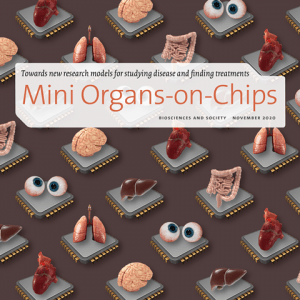After the successful launch of the Dutch version, as of today, also the English version of our booklet entitled ‘Mini Organs-on-Chips: Towards new research models for studying disease and finding treatments’, is available. It is also the first time that the Dutch Foundation ‘Biowetenschappen en Maatschappij’ offers one of her educative booklets in another language.
 This new publication in the series of so-called ‘Cahiers’ explains to a large audience, in an easy-to-understand language, what these promising Organs-on-Chips are, and what they can do and cannot (yet) do for health, and well-being of society and economy.
This new publication in the series of so-called ‘Cahiers’ explains to a large audience, in an easy-to-understand language, what these promising Organs-on-Chips are, and what they can do and cannot (yet) do for health, and well-being of society and economy.
A state-of-the-art overview is given of what can be expected from this technology, now and in the future. Examples illustrating the potential to improve and accelerate drug development, to enable personalized treatment and to reduce the number of animal experiments are included.
The booklet is an initiative of the Institute for human Organ and Disease Model Technologies (hDMT) and contains contributions from many of the top research groups in the Organ-on-Chip field in the Netherlands, including several NOCI members.
The booklet (€7,50) and the PDF (free download), both in English and Dutch, are now available via the webshop.
Abstract
Despite decades of research, there are still no drugs for many diseases. And the drugs that are available may only be effective in some patients or cause unwanted side-effects. Organ-on-Chip technology with human cells is a promising approach to address these problems. The models contain living human cells from specific organs that simulate the function, dynamics and structure of human organs in sickness and in health. Organ-on-Chip models could not only improve but also accelerate the drug development process and reduce its costs. In addition, this technology contributes to reducing the use of laboratory animals.
Source: hDMT
